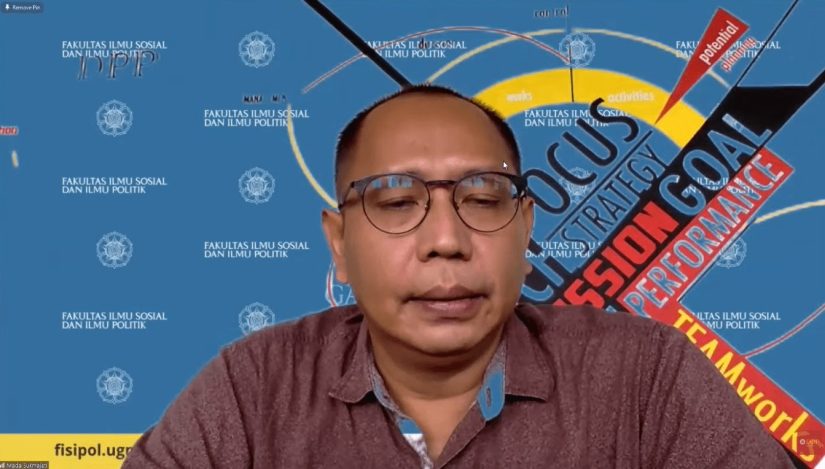
Yogyakarta, August 22nd 2022—The Department of Politics and Government of UGM Faculty of Social and Political Science (DPP FISIPOL UGM) held a public discussion on Monday (22/8). The public discussion was titled “The Two Sides of Diversity in School: Reflections on Tolerance and the Perception of Harmony Amongst Educators in Indonesia” which was created to disseminate the findings of the research made by DPP Fisipol UGM and KU Leuven. The three researchers that presented their findings were Sari Oktafiana, Ph. D Candidate at Centre for Research on Peace and Development (CRPD) KU Leuven; Anton Abdul, Candidate at CRPD KU Leuven; and Asep Mulyana, Doctoral Candidate in DPP UGM Political Science.
Sari was the first researcher who talked about her findings. Through her research, she tried to analyze how Islam political actors talk about Islam in high school. “My research was inspired by the fact that high schools in Indonesia often go through a change in curriculum and rules,” Sari said as she showed a photo of the difference between high school uniforms in the New Order Era and now. In 1986, the New Order government once banned the use of jilbab which got overruled in 1991. Now, there exists a polemic with the creation of Law of the Ministry of Education and Culture (Permendikbud) No. 45, 2014 which regulates the use of Muslim clothing. All of that changes show that Indonesia’s education is full of political contestation.
To map out the activities of the actor that contested Islam in the education realm, Sari did research on three public high schools in Yogyakarta. Public high schools in Yogyakarta were chosen as a unit of analysis because Yogyakarta is quite diverse in religion. “This diversity is not only concerning religion but also the difference of organization within a religion, such as NU and Muhammadiyah under Islam,” Sari said.
There are several findings that Sari elaborated on. First, the Islamization of Indonesian education can be seen in the amendment process of UUD 1945, the regulation of national education, and the change of curriculum. Second, Islamization is also done outside of the realm of regulation by teachers and conservative educators. “This means that Islamization is not only a structural or individual problem only, but it is both,” Sari said.
Anton was the second speaker. He talked about the perception of local teachers in Ambon schools of peace. “I tried to analyze how far Indonesian education tries to solve or minimize the risk of conflict,” Anton said.
Based on surveys and statistical data analysis, Anton found that teachers in Ambon have a positive perspective of the situation of peace in Ambon. It is quite unique that their perspective is quite different based on their religion. “Islamic teachers usually have a more negative perspective of peace in Ambon,” Anton said. The cause behind that negative perspective, according to Anton’s linear regression analysis, is the interaction between the minority and majority groups of religions. The closer the contact between groups with different religions, the more positive their perspective on peace.
Asep Mulyana was the last speaker in this public discussion. He talked about the politics of emotion and tolerance in the multicultural class program in SMK Bakti Karya Parigi, Pangandaran, West Java. “I chose emotion as the focus of my research because, in the last few research, emotion has an important role in pushing the society to do a political act,” Asep said.
SMK Bakti Karya Parigi was chosen because of several factors. “One of the unique things of SMK Bakti Karya Parigi was that their students came from different tribes, religions, and cultural backgrounds,” Asep said. That factor led Asep to research about tolerance in SMK Bakti Karya Parigi
Asep found that there was a Multicultural Class in SMK Bakti Karya Parigi. In the Multicultural Class, which first started in 2016, students of SMK Bakti Karya Parigi were exposed to the importance of multiculturality, tolerance, and peace. That multicultural value is not only an object of learning in class but it is also implemented in the interaction between classmates in their day-to-day activities. “This makes the values of multiculturalism, tolerance, and peace adopted and flourished naturally in SMK Bakti Karya Parigi,” Asep said.
